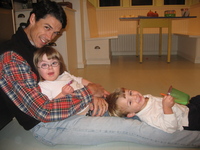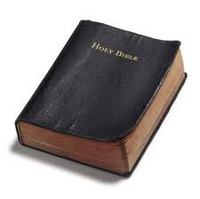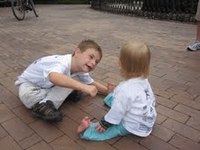 I have a new post over at Bloom: Parenting Kids with Disabilities (a site I highly recommend, by the way, if you are a parent of a child with disabilities) called “Would you Like to Have Down Syndrome?”
I have a new post over at Bloom: Parenting Kids with Disabilities (a site I highly recommend, by the way, if you are a parent of a child with disabilities) called “Would you Like to Have Down Syndrome?”
Our daughter Penny was born with Down syndrome almost five years ago. After the initial shock of her diagnosis wore off, we began to feel grateful – privileged even – to have a child with an extra 21st chromosome. Penny introduced us to a world of special needs and special people. She opened our hearts to a wider understanding of what it means to be human and what it means to see every human being as a gift.
Penny has a little brother, William, who is a typically-developing two-year old. She has another sibling on the way, due in January. When I was pregnant with William, I often received comments about how good it would be for Penny to have siblings. To have role models, so to speak. And I often responded, “Yes, and how good it will be for Penny’s siblings to have her.” As a role model, so to speak.
In our culture, having a family member with a disability is often viewed as a burden. When I wrote a piece for the Motherlode blog of the New York Times (Deciding Not to Screen for Down Syndrome) about my choice not to undergo prenatal screening during this pregnancy, many of the comments implied I was a negligent mother: negligent to the child in the womb, perhaps, but more so to William. William, it was assumed, would shoulder the ‘burden’ of caring for his sister, and he would also shoulder the ‘burden’ of caring for his younger sibling should I give birth to another child with special needs.
And yet when I look at Penny and William together, I don’t see one child who’s a burden and one child who’s bearing the brunt of having a sister with a disability. Rather, I see Penny and William in relationship. There are some difficulties–Penny grabs her brother’s toys sometimes and pesters him with her foot during meals and talks to him in a stern voice if he disobeys. William has temper-tantrums and says “no” just to bug her and grabs her toys in return. Together, they are learning how to share, how to communicate, and how their actions impact other people. Penny has a little brother who will help her when her fingers can’t manage a fine-motor task. William has the privilege of growing up with a big sister who has more empathy than almost anyone I’ve ever known. He sees her scamper to get a cane for her great-grandmother. He hears her ask to pray for the little boy in her class at school who can’t walk. Perhaps he notices the look of alarm on her face now that my pregnancy has progressed enough that I struggle to get up from playing with them on the floor. He sees the look of concern whenever he cries and she rushes to his side: “Do you need a hug, William?”
In other words, Penny is already a friend and an annoyance, a role model and a sparring partner. Some of that is because she has Down syndrome. Most of it is just because she’s his sister.
But life will be harder for Penny, I suspect, as she navigates the challenges of a society that has trouble accepting her and often mocks the characteristics associated with her condition.
Despite all the limitations that come with Down syndrome, I continue to believe that Penny’s life is a gift, and that she has a positive role to play in our family and in our community.
I was talking about these things with a friend the other day, and I said, “Other people see it as a negative that Penny is in our family, but I see it as just the opposite. I often wish that I had grown up with a sibling with Down syndrome. I think I would be a different person, a better person.”
My friend replied, “But have you ever wished that you personally had Down syndrome? If Down syndrome is a gift, then is it a gift you would want for yourself?”
And I said, “The thought has never crossed my mind.”
At first, I felt guilty. In this hypothetical universe, why wouldn’t I want that extra chromosome? Some of my answer stems from the reality that life with Down syndrome is, in many ways, harder than life without. But some of it is that I’m content with who I am, just as I am content with who our daughter is. I wouldn’t add a chromosome to my genetic makeup, but I also wouldn’t take it away from Penny’s.
What I would do, however, is offer every individual who doesn’t have Down syndrome the opportunity to know and love someone who does. People with Down syndrome are often talked about in polarizing terms. They are either a ‘burden’ or they are ‘angels.’ Neither is true. People with Down syndrome are people. Many of them face medical, social and emotional problems. Many of them also exhibit an extraordinary sense of compassion and care for others. Will Penny be a burden to her brother? I doubt it. I suspect that she will be a blessing to him, that she will add great joy to his life even as she needs his help in aspects of her own.
So I’m back to where I started: grateful that Penny and William have each other, grateful that this new baby will have these siblings, and grateful that I have the privilege of knowing and loving each one of my children.

